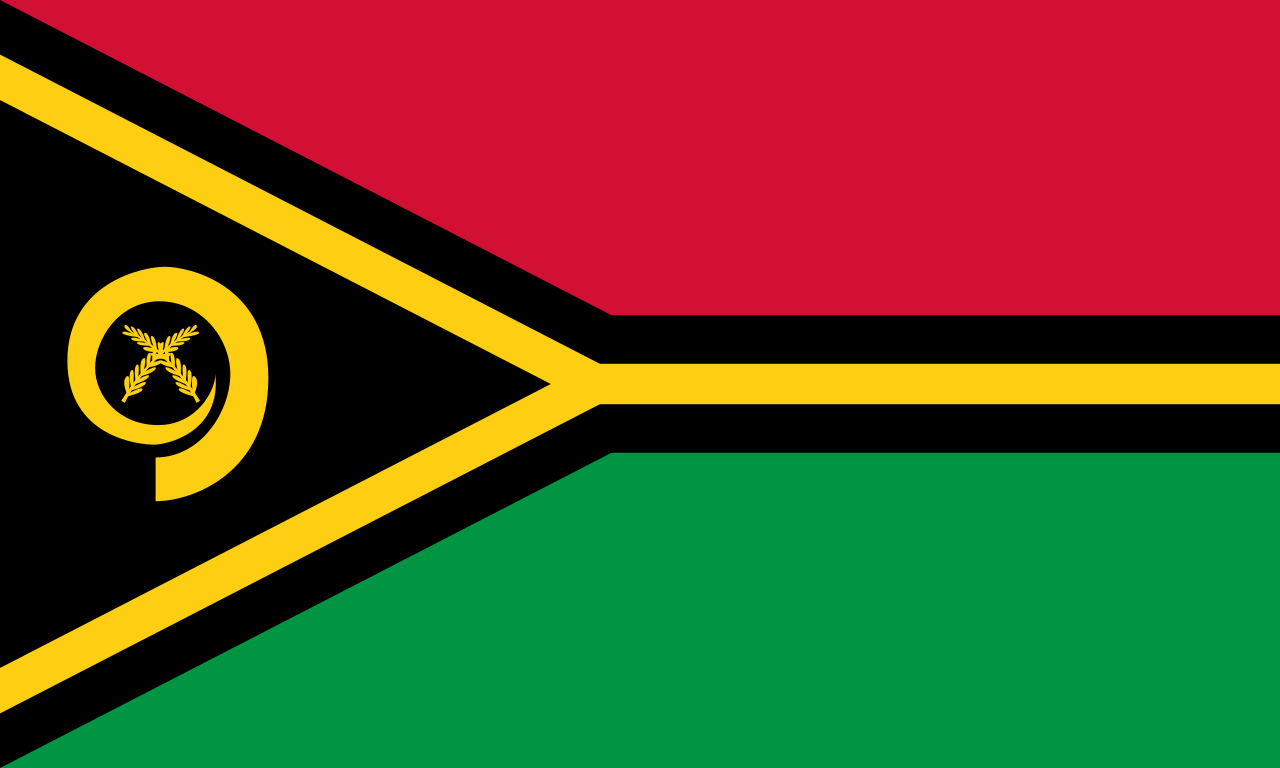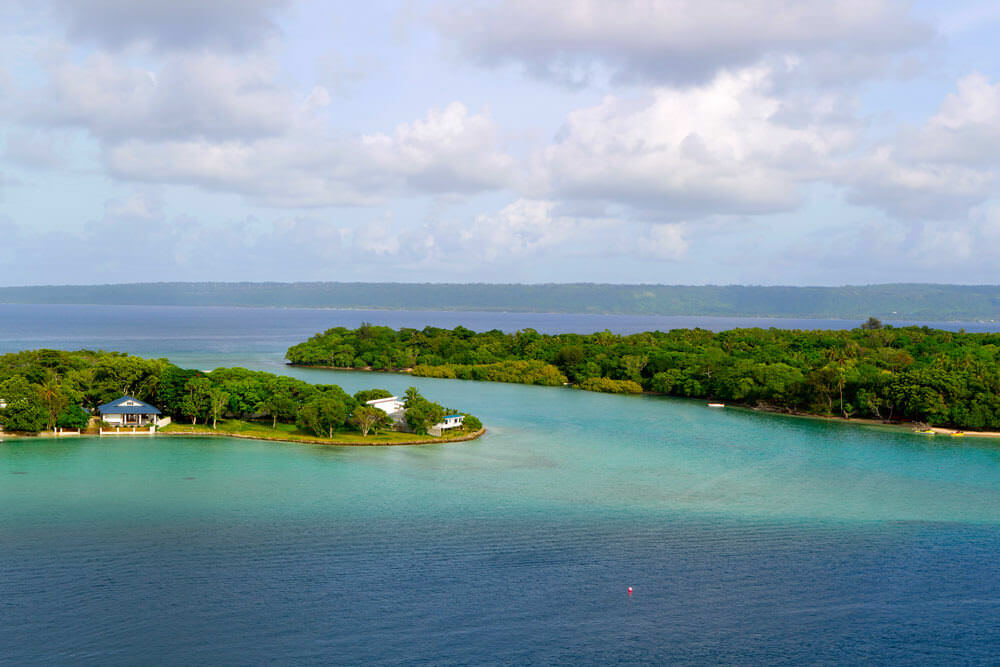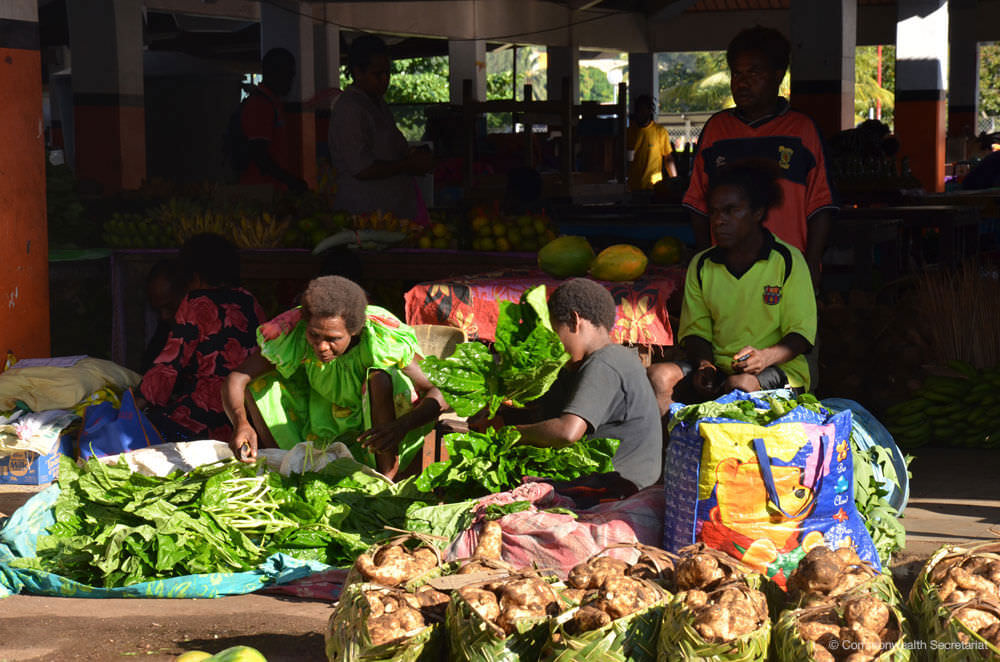Vanuatu

Region: Oceania
Capital City: Port Vila
(Gained independence): 30 July 1980
Joined Commonwealth: July 1980
United Nations HDI Ranking: 140
Official Languages: English, French, Bislama
Timezone: GMT+11
Currency: Vanuatu vatu (VUV)
Doing Business Rankings: 107 (2019)
Population: 321,832
Legal system: Common law, civil law
Main industries: Agriculture, offshore financial services, cattle, tourism
Principal exports: Copra, kava, beef, cocoa, timber
Located in the Southwestern Pacific Ocean, the Republic of Vanuatu consists of 83 islands arranged in an irregular Y shape. 13 of them are principle islands while around 65 are currently inhabited. Vanuatu’s 12, 189 sq km territory is covered with rainforests due to its tropical and sub-tropical climate, and home to various native animal species such as the flying fox and the flowerpot snake. Notably, the country has several active volcanoes, including Mount Yasur, which was labelled as one of the most accessible volcanoes in the world. Together with its impressive coral reefs and World War II shipwreck relics, Vanuatu provides a series of well-known tourist attractions, establishing itself as a prominent vacation destination.

Demographics
As of July 2022, Vanuatu is populated by approximately 321,832 people, and the number is growing at a rate of 2.4% per year. 74.2% of Vanuatuans reside in the rural areas and the remaining 25.8% live in either Port-Vila or Luganville, two of the largest cities in Vanuatu, due to the availability of better opportunities in the urban areas. A great majority of Vanuatu’s indigenous population is Melanesian, also known as Ni-Vanuatu, while some Polynesian descents reside on the outlying islands. Vanuatu also has small minorities of migrants from Europe, Micronesia, China and Vietnam. 70% of the population are Protestants, 12.4% are Roman Catholics, 3.7% are believers of customary beliefs, and 12.6% are followers of other religions.
Despite Vanuatu’s small population, it very linguistically diverse. The Constitution of Vanuatu recognizes the national language to be Bislama, an English-based Melanesian pidgin. English and French are the official lanugages as well as principle education languages, and more than 105 local Malenesian dialects are spoken in Vanuatu.
History
Vanuatu was first inhabited by Austronesian natives from the Solomon Islands in around 2000 B.C. In around May 1606, Portuguese explorers discovered the islands and thereafter the islands were frequented by Europeans. Originally known as New Hebrides, the islands were jointly administered by France and Britain since 1906 following the creation of the Joint Naval Commission in 1887. Conflict arose in the 1960s between the two colonisers regarding the independence of New Hebrides. All parties finally reached a consensus in 1977 at a conference in Paris and on 30th July 1980, the islands gained independence under the name Republic of Vanuatu, which means “our land forever” in Melanesian languages.
Vanuatu joined the Commonwealth in 1980 after it gained independence from Britain and France. The country is an earnest participant in the Commonwealth Games. After its debut in the Games in 1982, it has attended all Games since. In spite of its small population, the country has yielded considerable results, securing two medals at the latest 2018 Games. Vanuatu has also actively co-championed with the United Kingdom in leading the Commonwealth Blue Charter action group to tackle, among other issues, the problem of marine plastic pollution. As such, the country has since taken action to implement a ban on the use of plastic bags, straws and polystyrene food containers.
Key Dates
1606 – Portuguese explorer Pedro Fernandez de Quiros explores the islands and names them Terra Austrialis del Espiritu Santo
1774 – British explorer Captain Cook maps the islands as New Hebrides.
1887 – Britain and France enters into a Joint Naval Commission.
1906 – Britain and France makes the islands a Condominium which will be administered jointly.
1977 – British and French Governments and the Representatives of New Hebrides reaches and agreement for the independence of New Hebrides
1980 – New Hebrides gains independence and is renamed Republic of Vanuatu. In the same year, Vanuatu joins the Commonwealth.

Legal System and Government
Vanuatu is a parliamentary republic adopting the Westminster Model lead by the President as the head of state. According to the 1980 Constitution, the President is chosen every five years by an electoral college comprised of Members of the Parliament and the Presidents of Regional Councils, which are provincial governments for the six provinces respectively. The unicameral Parliament consists of 52 members with the term of four years elective by universal suffrage. Since 2016, the constitution allows for seats in the Parliament to be reserved for women. The Parliament is also responsible for electing the Prime Minister among its members who will head the government. Functions of the Parliament include passing and amending laws, approve the nation’s budget and scrutinizing the activities of the Government. Matters relating to custom and tradition, are passed to the National Council of Chiefs (Malvatumauri). In terms of national defense and security, Vanuatu does not have its own military, but rather, a domestic paramilitary unit called the Vanuatu Mobile Force.
Under the influence of Vanuatu’s colonial past, English common law, French civil and customary law that applied prior to its independence are still in effect. The judiciary is presided over by the Supreme Court which also has powers to decide on Constitutional matters. The Chief Justice of the Supreme Court is appointed by the President upon consultation with the Prime Minister, while other Vanuatuan judges are appointed by the President advised by the Judicial Service Commission.
Economy
Agriculture, fishing & forestry contributes to 18.7% of the country’s GDP. Vanuatu’s economy largely focuses on subsistence or small-scale agriculture, employing over 65% of the population and occupying 40% of the country’s total land area. The agriculture sector has constantly grown at an annual rate of 3.3%. The islands are especially suitable for growing various cash crops such as kava, cocoa, copra (a coconut-based product), coconut and coffee. Under the Government’s Technical and Vocational Education and Training (TVET) programme, the Department of Agriculture is actively cooperating with key stakeholders to improve the quality and supply capacity of agricultural products. Fishery is also a significant sector in Vanuatu’s economy. Abundant resources from the oceanic and coastal waters support industrial fishing, such as for commercial species of tuna. The Vanutuan Government is actively promoting sustainable management and development of the fisheries industries in accordance with the Vanuatu National Fisheries Sector Police 2016-2031. Some strategic actions taken include investing in investing in infrastructures such as port and processing facilities, establishing centralized fish markets in urban areas and strengthening fisheries law enforcement. These measures are targeted towards maximizing the potential of Vanuatu’s fisheries sector.
Another sector making substantive contribution to Vanuatu’s economy is tourism. Prior to Covid-19, Vanuatu attracts around 350,200 visitors each year, gaining US$ 325million in revenue which is 48% of its GDP. Tourists have flocked to the country to enjoy the stunning beaches, swim in blue holes and go scuba-diving. Vanuatu has also preserved much of its traditional art, including music and dances such as its unique snake dance, as well as handicrafts, which are produced and sold for tourists. In response to setback brought by the pandemic restrictions, the Department of Tourism has launched the Tourism Crises Response and Recovery Plan 2020 to 2023 to support the tourism industry. Under the Recovery Plan, the Tourism Business Support Programme aims at providing financial and technical assistance for tourism businesses to promote sustainable tourism and product diversification. With Vanuatuan borders re-opening on 1st July 2022, it is expected that there will be an influx of visitors and a further boost to Vanuatu’s tourism.
Off-shore finance and insurance services accounted for 7.4% of the country’s GDP. Vanuatu is a tax haven as it imposes no taxes affecting individuals other than import duties, and no corporate taxes on local and offshore income. Other attractive benefits of setting up a company in Vanuatu include low fees for forming a business, no auditing requirements and companies can retain a high level of privacy under Vanuatuan laws. One other major revenue source of Vanuatu is its citizenship-through-investment program, accounting for around 30% of the country’s revenue in 2019. Vanuatuan passport holders can enjoy tax benefits, and gain visa-free access to 136 countries across the globe. With prices starting at US$130,000 and its expedient process of 45 days’ arrangement, this program makes it a popular choice for people around the world.
Trade
In 2021, the GDP in Vanuatu was around US$0.96 billion. The total export of goods and services total up to US$ 347 million while the total import of goods and services is US$ 463.7 million. In terms of merchandise exports for the year, Vanuatu’s top exports included fish, crustaceans, molluscs and other aquatic invertebrates (44.1%), ships, boats and other floating structures (40.9%) and oil seeds and oleaginous fruits; miscellaneous grains, seeds and fruit (10.3%). The top export destinations are Malaysia (20.4%), Philippines (18.0%), New Zealand (11.4%) and Australia (11.3%). In terms of imports, Vanuatu largely imported petroleum oils and oils from bituminous minerals excluding crude oil (12.7%), machinery, mechanical appliances, nuclear reactors, boilers (8.4%), vehicles other than railway or tramway rolling stock (6.0%) and electrical machinery and electronics (5.6%). These imports predominantly originated from Australia (29.7%), Singapore (18.2%), New Zealand (12.7%), and Fiji (8.0%).
Vanuatu is a party to multiple free trade agreements such as the Melanesian Spearhead Group Trade Agreement and the Pacific Island Countries Trade Agreement which are agreements with sub-regional pacific islands giving preferential duty free access of products into the signatories. Vanuatu has also entered into preferential trade agreements with China, which allows duty-free import and export of goods into and out of China, and with the EU, which gives preferential duty rates to products imported into the EU. Specific to the fisheries industry, Vanuatu is also a signatory to various sub-regional, regional and international treaties. Some of which include the Melanesian Spearhead Group Coastal Fisheries Roadmap (2015–2024), the Pacific Islands Forum Fisheries Agency Regional Melanesian Spearhead Group Strategy (2010–2015), A new song for coastal fisheries – pathways to change: the Noumea Strategy (2015), the Pacific Regional Roadmap on Fisheries (2010), the Samoa Pathway (2014) and the Sustainable Development Goals (2014). These policies aim at managing and developing the fisheries sector to ensure responsible fishing, sustainable stock management and biodiversity conservation.
Investment Opportunities
Tourism, agriculture and fisheries are the most popular industries among investors. Since the government is making further developments to the airport, hospitality facilities are in high demand. Investors could also look into opportunities promoting eco-tourism. The Vanuatuan Government is actively promoting sustainable development in the agriculture and fisheries industries, opening up various investment opportunities. These include growth and export partners for rare flowers in Vanuatu, fish exportation, processing facilities, marine management technology and systems, as well as cannabis export and cultivation.
Vanuatu also has investment opportunities for real estate and infrastructure. Eton Reef is a 110 acre Residential Forest Parkland located on the South East Coast of Vanuatu. Lots start from US$ 260,000, investors can tailor their area to enjoy the relaxing lifestyle in Vanuatu. In terms of infrastructure, Forari Bay is dedicated to provide fishing fleet ports, inter-island ferry terminal, luxury yacht marina, light industry, agricultural areas and residential units. This US$ 45million project will be operated as a Public Private Partnership alongside the Vanuatuan Government and is seeking funders to support 25 elements over a 6-year period.
As mentioned above, Vanuatu citizenship is another attractive opportunities for investors. The Vanuatu Development Support Programme is the only citizenship programme in the Asia Pacific Hemisphere. With US$130,000, investors can enjoy visa-free entry into more than 100 countries without having to reside in Vanuatu nor pay any income, wealth and inheritance taxes.